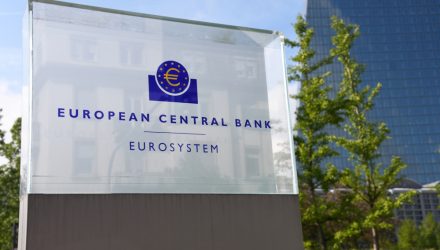International bond exchange traded funds could be in trouble as investors think about cutting exposure to Eurozone debt with the European Central Bank looking to taper its emerging bond-purchasing program.
Over the past three months, the iShares International Treasury Bond ETF (IGOV) fell 1.3%, and the SPDR Bloomberg Barclays International Treasury Bond ETF (BWX) dropped 1.0%. IGOV is down 5.0%, and BWX is 4.8% lower year-to-date.
As ECB policymakers meet next week, bond traders are worried about the central bank’s reaction to the highest inflation rate of over a decade, following data this week that showed a 3$ annual increase in Eurozone consumer prices over August, compared to the bank’s 2% target, the Financial Times reports.
Many ECB policy-setters have suggested that the accommodative pandemic-era debt purchases could be curtailed earlier than previously expected in response to the inflationary pressures.
“We are seeing investors pricing in some risk of a taper at the September meeting,” Mohammed Kazmi, a portfolio manager at Union Bancaire Privée, told the Financial Times. “Up until now, the market had been pretty comfortable that they would keep going at the current pace to the end of the year.”
For example, Germany’s benchmark 10-year bond yield was up to minus 0.36% Wednesday morning, the highest in over a month and up from minus 0.5% two weeks ago – rising yields reflect the fall in bond prices.
The ECB has been implementing a €1.85 trillion pandemic emergency purchase programme to provide liquidity for the Eurozone’s debt markets since the start of the coronavirus pandemic. The accommodative measures have helped keep yields depressed even while governments continued to issue a record amount of debt to fund their economic recovery.
Observers anticipate ECB president Christine Lagarde to plan out a way for its longer-running quantitative easing program to take over from the emergency PEPP.
“I think it will be a dovish tapering by the ECB next week, with a heavy emphasis that committing to a slower pace on PEPP does not entail a tightening while signaling it retains the flexibility to increase the pace if financing conditions tighten, and that policy will remain highly accommodative after PEPP ends next year,” Katharina Utermöhl, an economist at Allianz, told the FT.
For more information on the markets, visit our current affairs category.

